|
| NEWS |
 |
| World’s top arms producers see revenues rise on the back of wars and regional tensions |
|
On 2 December, SIPRI released its latest data on the revenues from sales of arms and military services by the 100 largest companies in the industry, which totalled $632 billion in 2023, a real-terms increase of 4.2 per cent compared with 2022. Arms revenue increases were seen in all regions, with particularly sharp rises among companies based in Russia and the Middle East. Overall, smaller producers were more efficient at responding to new demand linked to the wars in Gaza and Ukraine, growing tensions in East Asia and rearmament programmes elsewhere.
|
|
|
Read more | Read the SIPRI Fact Sheet | Explore the interactive table | Access the SIPRI Arms Industry Database
|
|
|
 |
| New SIPRI research examines the expansion of the NewSpace industry |
|
This month SIPRI released an interview with Kolja Brockmann and Lauriane Héau, researchers with SIPRI’s Dual-Use and Arms Trade Control Programme, about a study they conducted on the expansion of the global space sector, referred to as ‘NewSpace’. The study, which mapped over 600 NewSpace companies across 84 states, culminated in two reports. In the interview, the authors reflect on the results of the pilot study and explore potential next steps for the Missile Technology Control Regime.
|
|
|
Read more | Watch the interview | Read the SIPRI Fact Sheet | Read the SIPRI Report
|
|
|
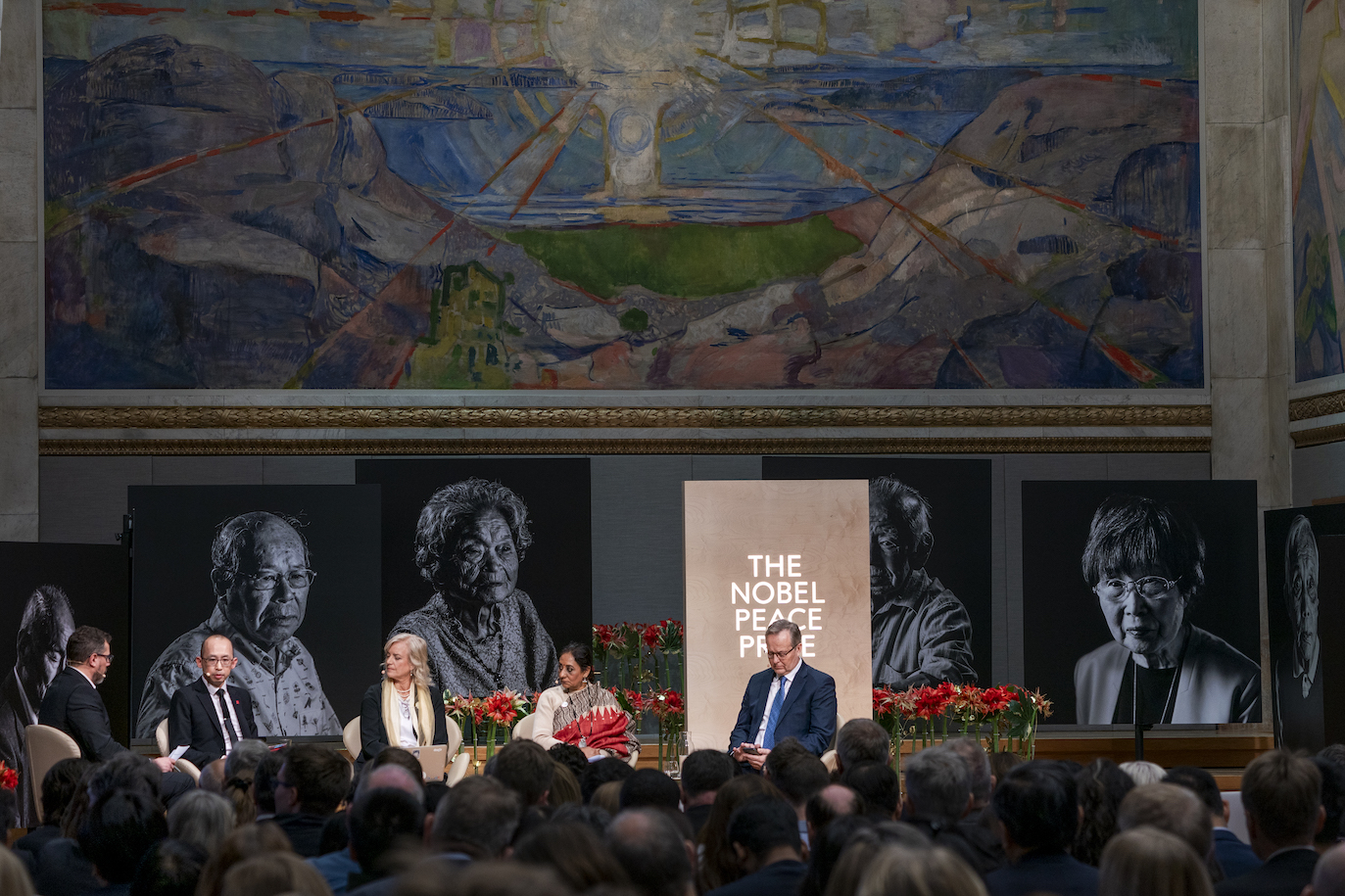 |
| SIPRI experts participate in Nobel Peace Prize event |
|
On 11 December, two leading SIPRI experts—Dr Wilfred Wan, Director of SIPRI’s Weapons of Mass Destruction (WMD) Programme, and Hans M. Kristensen, Associate Senior Fellow in SIPRI’s WMD Programme and Director of the Nuclear Information Project at the Federation of American Scientists—took part in a panel on nuclear weapons organized by the Nobel Peace Prize. During the event ‘NUKES—How to counter the threat’, panellists discussed strategies to mitigate the risk of nuclear war and advance towards nuclear disarmament.
|
|
|
Read more | Watch the panel
|
|
|
 |
| SIPRI co-hosts course on non-proliferation and disarmament |
|
On 2–5 December, SIPRI and the European Union Non-Proliferation and Disarmament Consortium (EUNPDC) hosted the course ‘WMD Non-Proliferation and Disarmament Pathways’. The course brought a group of students to Stockholm for an intensive introductory course on the non-proliferation and disarmament of WMD. SIPRI interviewed one of the experts who delivered the course, Dr Stephan Klement, on the key security challenges relating to Iran and its nuclear programme.
|
|
|
Read more | Watch the SIPRI Spotlight Interview
|
|
|
 |
| SIPRI researchers lead discussions on quantum technologies |
|
In November, SIPRI partnered with the United Nations International Computing Center and Quantum Delta NL at two events exploring the peace and security implications of quantum technologies. At the first event, SIPRI experts, Dr Sibylle Bauer, Director of Studies, and Dr Alexander Blanchard, Senior Researcher, co-chaired a session on peace, security and disarmament. The second event, an expert workshop, explored military applications of quantum technologies, the use of quantum sensing for arms control and verification, quantum technology supply chains, and responsible quantum research and innovation.
|
|
|
Read more
|
|
|
|
| COMMENTARY |
 |
| Implications of the UN resolutions on ‘international cooperation on peaceful uses’: Balancing non-proliferation and economic development |
|
On 2 December, the UN General Assembly adopted a resolution on ‘Promoting international cooperation on peaceful uses in the context of international security’. The new resolution, like its two predecessors, ‘reaffirms’ that the right to benefit from international cooperation in science and technology for ‘peaceful uses’ should not be hampered by states’ implementation of non-proliferation obligations. The resolutions have been viewed by many states as a critique of the multilateral export control regimes and a threat to their long-term viability. This backgrounder assesses the potential impact of the resolutions on the regimes and global non-proliferation efforts.
|
|
Read the SIPRI Topical Backgrounder
|
|
|
 |
| Long-term investment is essential to addressing protracted food crises—even amid conflict |
|
Food systems are critical for building peace, resilience and food security. However, in contexts affected by conflict, food systems face formidable challenges, which undermine and deter long-term private and public investment in food. This guest blog argues that to reduce food crises sustainably, aid actors across the humanitarian, development and peace nexus must identify new ways of addressing the risks associated with food systems in fragile settings, through their programming and investments.
|
|
Read the SIPRI WritePeace Blog
|
|
|
|
 |
| External outlets |
|
SIPRI experts were recently featured in these external outlets:
|
|
|
|
| UPCOMING EVENTS |
| |
| 18 December 2024 |
| The UN discussion on technology transfers and ‘peaceful uses’: Balancing non-proliferation and economic development |
|
On 18 December, SIPRI will host an online event to explore how states and international organizations can bridge the conflicting perspectives that were exposed during the adoption of the 2024 UN General Assembly resolution on international cooperation on peaceful uses.
|
|
Read more | Register | Read the related SIPRI Topical Backgrounder
|
|
|
| RECENT EVENTS |
| |
| November–December 2024 |
| SIPRI holds seminars in Brussels and Berlin to discuss future of EU civilian crisis management |
|
In November and December, SIPRI held seminars in Brussels and Berlin to discuss the future of EU civilian crisis management. A new report by SIPRI Senior Researcher Timo Smit was launched at the first event, held together with the Permanent Representation of Poland to the EU. A second event on the same topic was held in collaboration with the European Centre of Excellence for Civilian Crisis Management and hosted by the German Federal Foreign Office.
|
|
Read more | Read the report
|
|
| |
| November–December 2024 |
| SIPRI holds expert roundtables on climate, peace and security |
|
SIPRI organized a series of climate, peace and security roundtables in November and December. The roundtables convened researchers, experts, practitioners and policymakers to discuss the effects of climate change on peace and security and reflect on opportunities to confront climate-related security risks. The roundtables were anchored in SIPRI’s Climate, Peace and Security Fact Sheets, a series produced jointly with the Norwegian Institute of International Affairs.
|
|
Read more | Read the most recent fact sheet
|
|
| |
| 21–22 November 2024 |
| SIPRI and the UK host workshop on nuclear escalation and outer space |
|
On 21–22 November, the SIPRI WMD Programme hosted a workshop on ‘Nuclear Escalation Pathways and Outer Space: Views from Europe’. The workshop was held at SIPRI in Stockholm as part of a research project sponsored by the United Kingdom’s Foreign, Commonwealth and Development Office. The workshop convened experts and policymakers to discuss potential nuclear escalation pathways involving space systems, in the context of the changing European security environment and ongoing war in Ukraine.
|
|
Read more
|
|
| |
| 3 October 2024 |
| SIPRI participates in roundtable in Somalia on community engagement |
|
On 3 October, SIPRI experts participated in a roundtable to discuss community engagement at the climate–conflict nexus in Somalia. The event drew from insights in a recent SIPRI report by Kheira Tarif, Researcher in the SIPRI Climate Change and Risk Programme, ‘Burning Ground: Tackling Climate Change and Conflict in South-central Somalia’.
|
|
Read more | Read the report
|
|
|
|
| PUBLICATIONS |
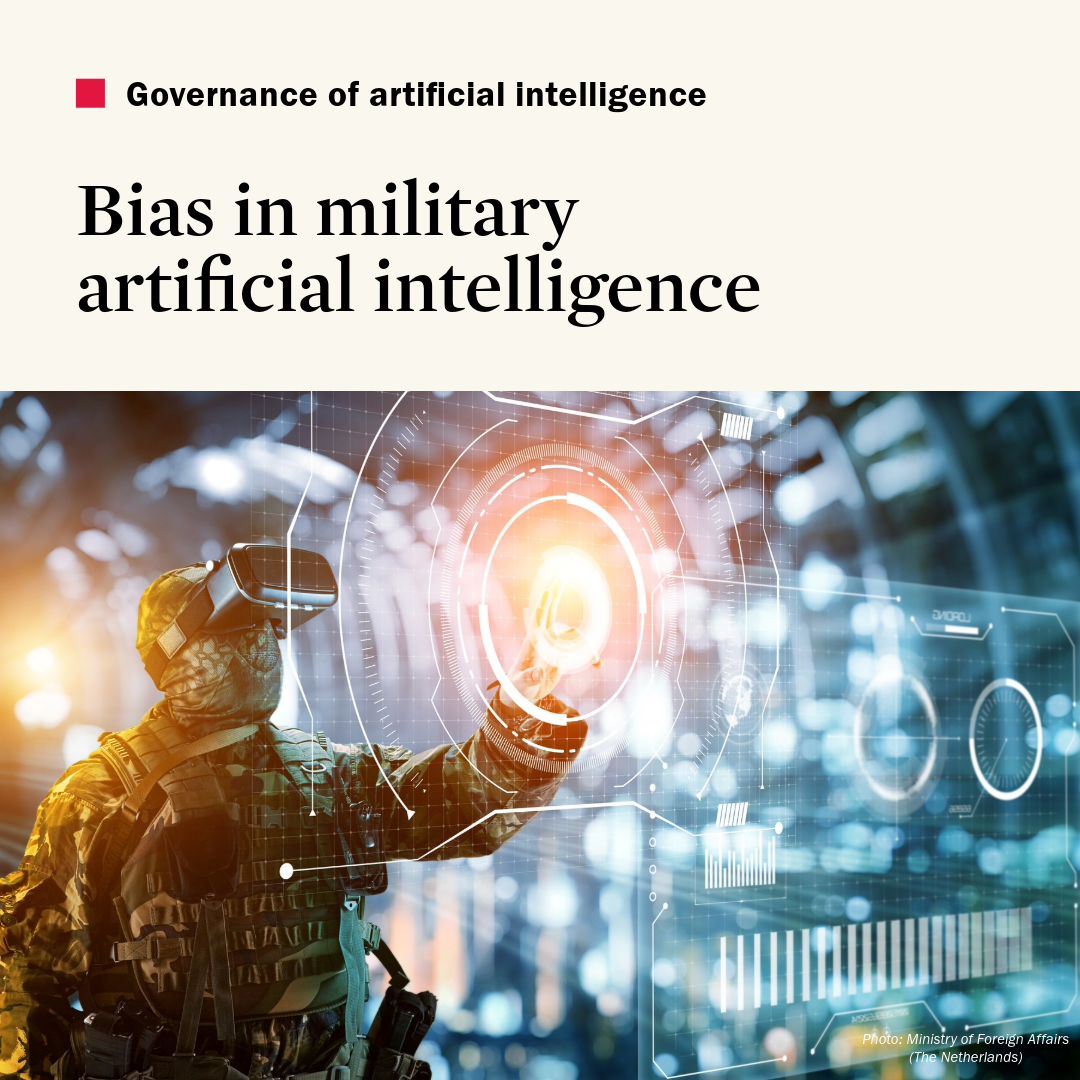 |
| Bias in Military Artificial Intelligence |
|
Artificial intelligence (AI) systems are biased. In various ways and degrees, they reflect and reproduce existing human biases around, for example, gender, race, age or ethnicity. In order to identify and respond to the humanitarian implications of bias in military AI, policymakers need a deeper, shared understanding of the issue. This background paper, intended as a common reference document, aims to support such efforts. It explores what ‘bias in military AI’ refers to, outlines sources of bias and details some of the potential humanitarian consequences.
|
|
Read the SIPRI Background Paper
|
|
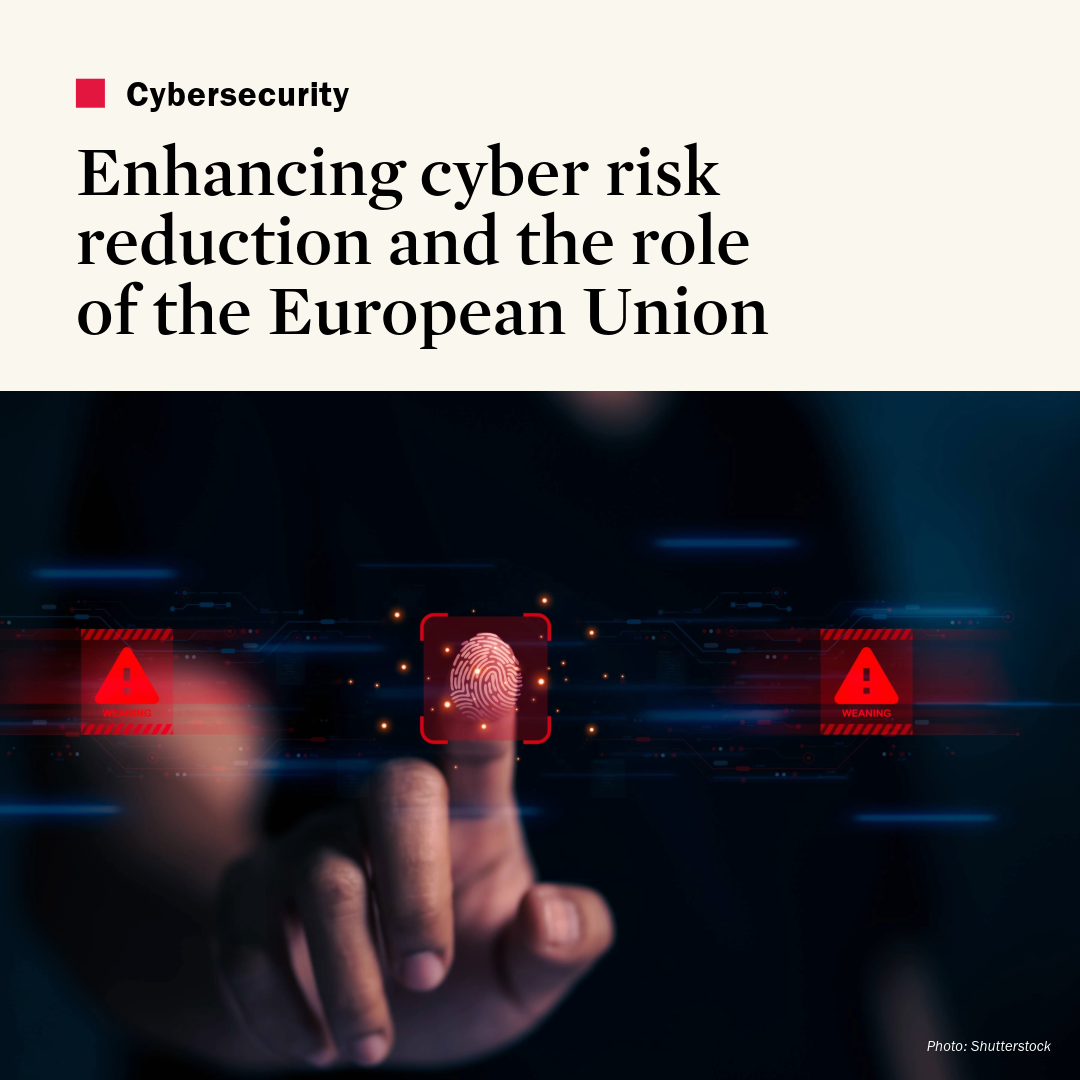 |
| Enhancing Cyber Risk Reduction and the Role of the European Union |
|
Cyber risk reduction within and among China, Russia, the United States and the EU has become increasingly important, while significantly more challenging. Despite their different threat landscapes, all four cyber actors face similar cyber risks and regulatory challenges. This SIPRI Research Policy Paper builds on previous SIPRI research, including a workshop with Chinese, Russian, US and European experts, to explore the respective views on cyber risk reduction regulatory measures and recommendations for enhancement. It concludes by suggesting ways the EU can enhance its role in cyber risk reduction.
|
|
Read the SIPRI Research Policy Paper
|
|
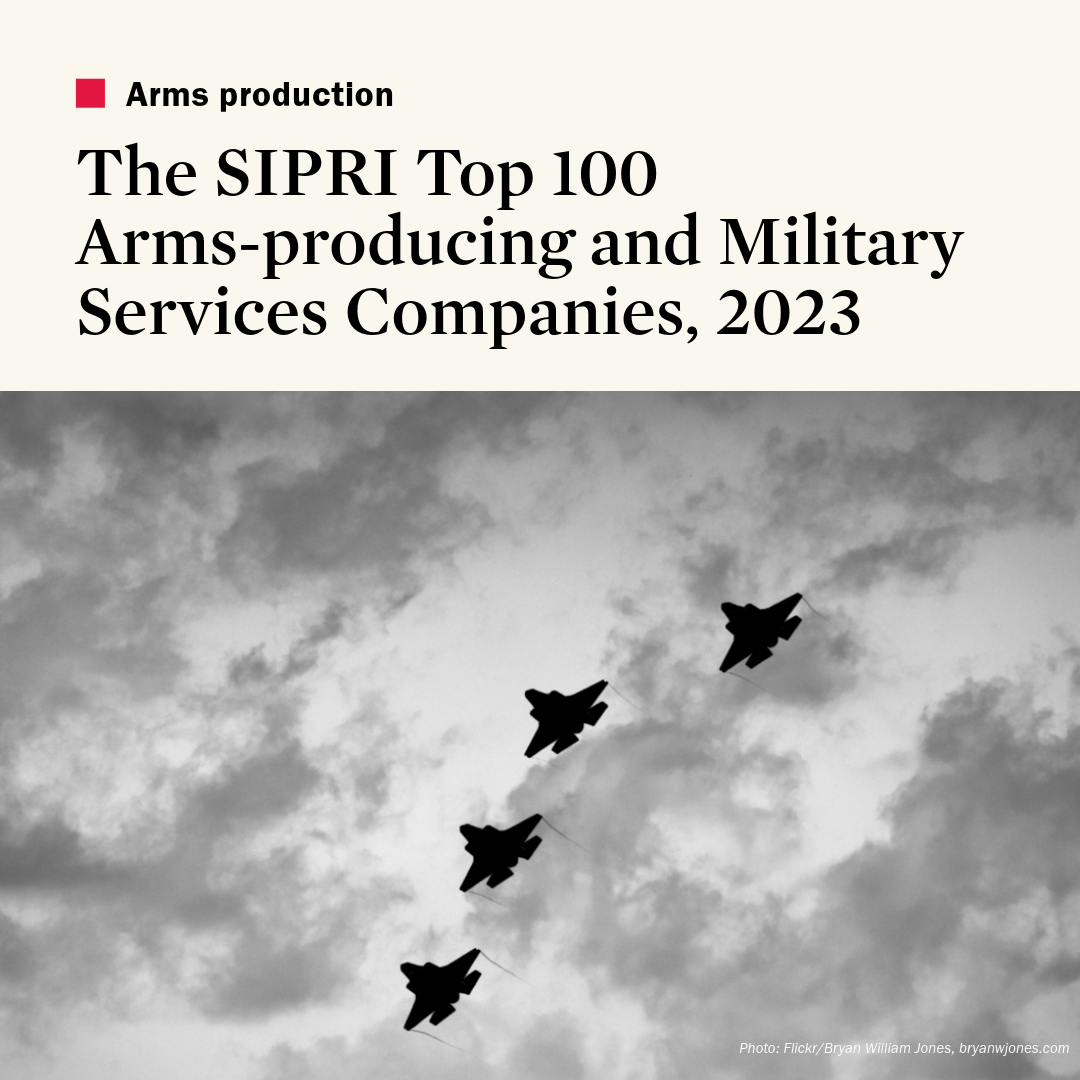 |
| The SIPRI Top 100 Arms-producing and Military Services Companies, 2023 |
|
The combined arms revenues of the world’s largest arms-producing and military services companies (the SIPRI Top 100) increased by 4.2 per cent in 2023 to reach $632 billion. The total arms revenues of the Top 100 grew by 19 per cent between 2015 and 2023. This fact sheet lists the SIPRI Top 100 for 2023 from the updated SIPRI Arms Industry Database and describes the trends in the industry’s arms revenues that are revealed by the new data.
|
|
Read the SIPRI Fact Sheet
|
|
 |
| The Potentially Revolutionary Impact of Emerging and Disruptive Technologies and Strategic Conventional Weapons on the Nuclear Deterrence Debate |
|
This paper posits that the combination of emerging and disruptive technologies (EDTs) and strategic conventional weapons may have a revolutionary impact on the future of the debate about nuclear weapons. It argues that EDTs make nuclear weapons more vulnerable and considers why potential mitigating strategies to combat the destabilizing effect of these new technologies and weapon systems are unsatisfying. It also argues that strategic conventional weapons in combination with some of the emerging technologies and weapon systems could be a viable alternative to nuclear deterrence.
|
|
Read the report
|
|
 |
| The Nexus of Non-traditional Security and Nuclear Risk: Implications for EU Foreign Policy in the Indo–Pacific |
|
The updated EU Indo–Pacific Strategy highlights the growing strategic importance of the region for the EU’s foreign policy goals, incorporating both traditional security matters and non-traditional security (NTS) concerns. However, the strategy falls short by siloing policy implementation and not addressing the significant nuclear escalation risks among the region’s nuclear-armed states, which could have severe global consequences, including for Europe. The paper proposes that the EU should incorporate NTS-focused risk reduction measures into its Indo–Pacific Strategy, alongside traditional nuclear risk reduction efforts.
|
|
Read the report
|
|
|
|
|
|
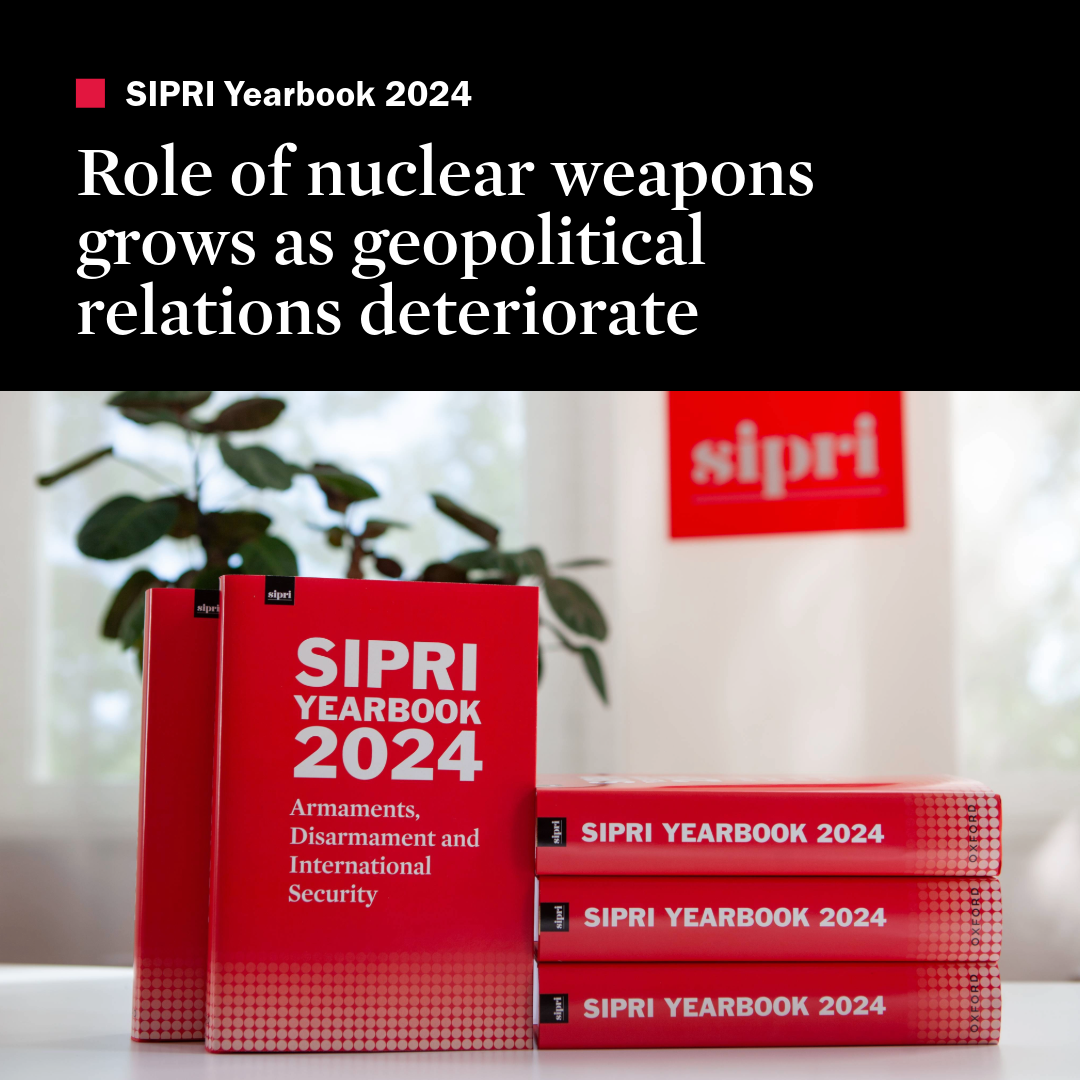 |
| SIPRI Yearbook 2024 |
SIPRI Yearbook 2024 presents a combination of original data in areas such as world military expenditure, international arms transfers, arms production, nuclear forces, armed conflicts and multilateral peace operations, with state-of-the-art analysis of important aspects of arms control, peace and international security. In addition to its detailed coverage of nuclear arms control and non-proliferation issues, the latest edition of the SIPRI Yearbook includes:
- insight on developments in conventional arms control in 2023;
- regional overviews of armed conflicts and conflict management;
- in-depth data and discussion on military expenditure, international arms transfers and arms production; and
- comprehensive coverage of efforts to counter chemical and biological security threats.
|
|
Browse the contents page | Download the summary (PDF) | Download the sample chapter on world nuclear forces (PDF) | Download the introductory chapter (PDF) | Order SIPRI Yearbook 2024
|
|
|
| |
|
|
|
|